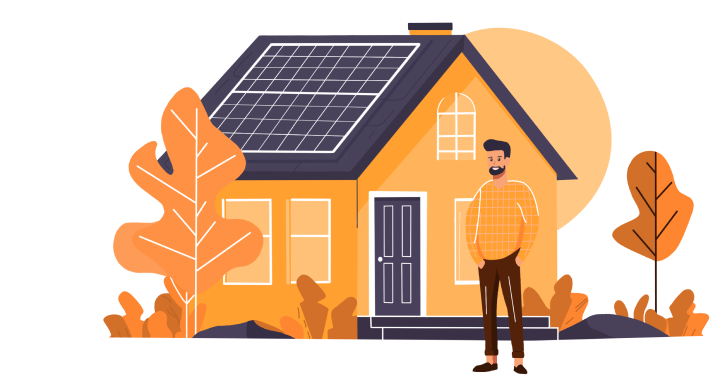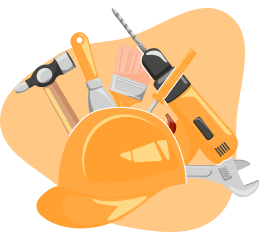Is your home optimized for solar power panels installation? Many homeowners overlook key factors that could improve their solar efficiency.
Solar Energy Host simplifies the process by providing essential knowledge and tools to ensure a smooth transition to an efficient solar panel setup. This article explains how to make the switch to this renewable energy as seamless and beneficial as possible.
Step #1: Check if your home is good for solar panels.
An ideal roof for solar power panels installation has lots of open space and faces south to get the most sunlight. The amount of sunlight your area gets also affects how well solar panels work.
You can use the PVWatts calculator from the Department of Energy to find out how much solar energy you might produce at home. This tool considers your local weather patterns and historical sun exposure data.
Remember, things like growing trees or new buildings can block sunlight in the future. It's smart to think about not just now but also how shading might change, which can potentially reduce the solar output of your residential solar installation.
Step #2: Choose the right solar panels and equipment.
When choosing the type of solar installation, think about what fits your needs best. Monocrystalline panels, though more costly, are efficient and great for small spaces because they generate a lot of power from a small area.
Polycrystalline panels are less efficient but cheaper, which might be good enough depending on how much energy you need and how much space you have. On the other hand, thin-film panels are flexible and can fit various spaces, but they are generally less efficient.
Moreover, it's important that the frames and supports for your solar power panels installation are strong enough to last through weather changes and are set up correctly to catch as much sunlight as possible. Make sure the mounting system of the rooftop solar panel installation works with your chosen solar panels and fits your roof type.
Another critical component of the solar power system installation is the inverter. It changes the DC electricity from the solar panels into AC electricity that your home uses. String inverters are a common choice.
However, if your panels are shaded or face different directions, microinverters or power optimizers can work better. Adding a battery storage system can also help by storing extra solar energy for times when it's not sunny.
Step #3: Secure financing and incentives.
You can save money on your solar power panels installation through the federal solar tax credit, which covers 30 percent of the installation costs until 2032. After this, the credit will be reduced to 26 percent in 2033 and 22 percent in 2034. State-specific incentives, including extra tax credits, rebates and other benefits, can also lower the cost considerably.
Many states and local utilities provide rebates that reduce the upfront solar panel installation cost. These rebates vary by location. Some states also offer Solar Renewable Energy Credits (SRECs), which you can sell to make additional income.
For homeowners who prefer not to pay the solar power installation cost all at once, there are financing options like solar loans and solar leases. With a loan, you own the system and can claim the federal tax credit. Leases and Power Purchase Agreements (PPAs) have no initial costs but don't qualify for tax credits because you don't own the system.
Step #4: Find a reputable solar installer.
To ensure a high-quality solar power panels installation, choose a solar installation company with a certification that is well-regarded in the solar industry. Make sure the solar panel installer is also licensed and insured, and check that they have a solid history of solar panel installation services in your area.
Examine the credentials of the solar installation company thoroughly. Ask for references and read customer reviews to gauge their reputation and the satisfaction of previous clients.
Review the warranty terms carefully. Reputable solar power installers offer substantial warranties that cover both the equipment and their labor. Make sure the warranty includes all parts of your solar system, like the panels and inverter. Understand the duration of the warranty and exactly what it covers.
Frequently Asked Questions (FAQ)
How do solar panels work?
Solar panels convert light into electricity using a process called the photovoltaic effect. Here's how it works: The panels are made of materials that absorb sunlight, which makes electrons move and creates an electric current. This current can power devices or be sent into the electrical grid to be used elsewhere.
How do I monitor the performance of my solar panels?
Keeping an eye on how well your solar panels are working is important to make sure they're as efficient as possible. You can use monitoring systems that check things like how much energy the panels produce and use.
How long does it take to recoup the cost of installing solar panels?
The payback period for solar panels depends on various factors, including the cost of installing solar panels, the amount of sunlight your location receives and local electricity rates. On average, it takes about seven to eight years to recover the initial costs through savings on your energy bills. After that, you can continue to save money for many years, as most solar panels last over 25 years.
Explore solar energy savings with Solar Energy Host
Solar Energy Host offers a platform that demystifies the costs and benefits of installing solar. We help you by providing what you need to know about solar energy and solar power panels installation. We make it easy to understand and compare your solar options in a no-pressure space, helping you make well-informed decisions confidently.
We're here to explain how solar power can lower your utility bills, improve your home's energy efficiency and contribute to environmental sustainability.
Start your journey to a sustainable future with Solar Energy Host today. Calculate your potential savings and embrace the chance to lower your energy bills while adopting a greener lifestyle.














